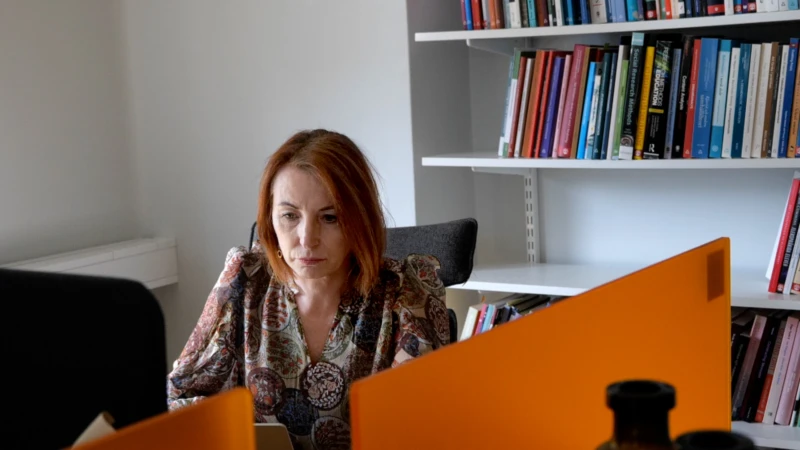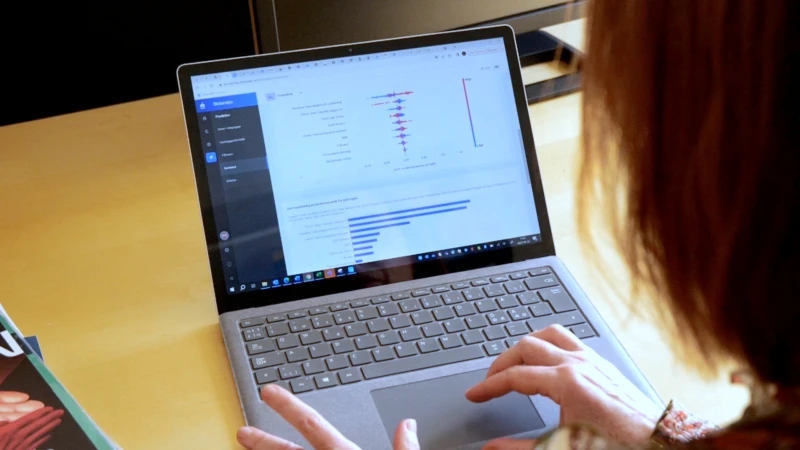Now AI technology is coming to school – to dive deep into data
Pupils need more passing grades. But how? All schools in Helsingborg will soon have access to technology that will find the answer. The digital tool will create automated analyses that take a deep dive into the operations.

It is about removing assumptions and gut feelings because when the city’s goal is for more school pupils to get passing grades, assumptions and gut feelings are not enough.
Instead, analyses are needed. Analyses that get to the bottom of the methods that work and do not work in schools so that schools can implement the suitable measures in the right place.
Andreia Balan is one of two lecturers at the City of Helsingborg’s School and Leisure Administration. Her job is to conduct research and develop the schooling system.
”We have a lot of data in the school world. But the data is often in different systems and it requires knowledge to extract and combine them, you almost have to have a degree in data analysis to succeed,” she says.
The tool generates automatic analyses
For the past four years, the project has been running to aid schools in making decisions based on data easier.
The project has developed a digital tool that collects all available data, processes it and generates automatic analyses. The goal is to make it easy for principals and teachers to obtain reports that show what is vital for school results in black and white.
For example, the tool can show the link between absence and grades, how staff turnover affects attendance, or how the socio-economic situation in a neighbourhood affects the importance of school attendance.
”If you ask people on the street, everyone says it’s not good to be absent from school. But we see a more nuanced picture. In some areas, depending on socio-economic background, absence plays less of a role in grades,” says Andreia Balan.
”Then you can ask yourself the next question: if a student is absent and still has good results, how do we get them to come to school anyway? Because there are also social aspects of attendance. Politicians want to increase school attendance. But in order to do that, you may have to work in different ways with different pupils,” she says.

Widely rolled out after procurement
Three schools were involved in the pilot project, and there has been a reference group of teachers and principals who have had to assess what is useful. The analyses must be easy to understand, even if they are complex.
The tool is ready for use, and the aim is to roll out the technology to all 32 primary schools. Before that, the City of Helsingborg will carry out a procurement process, which is underway.
An app to assess knowledge in pre-schools
Intensive work has also been going on in pre-schools. Part of the challenge that has occurred is getting hold of data. Pre-schools do not have the same tradition of assessment and measurement as primary schools.
The solution was a digital app called Myran. In it, pre-school children are given a set of questions that create a picture of their knowledge development. The data from the app is sent to the analysis tool, where it can be linked to, for example, staff turnover and sickness absence.
“The analyses have given us new insights. Story reading is one example. Here we see that there are links to socio-economic background and staff sickness absence. When staff are ill and substitutes arrive, reading aloud is often the first thing to be cancelled in areas with a weak socio-economic background. Which is exactly the opposite of what you should do in areas where you need to compensate for the children’s home conditions,” says Andreia Balan.
Schools need to translate lessons learnt into practice
Today, almost half of the city’s 74 pre-schools are already using the Myran app, and the remainder are on their way.
There are also requests for an analysis module for secondary schools. The aim is that the tools will strengthen teaching and make more people eligible for upper secondary school. A beneficial asset to have when entering the labour market.
”The tool is intended to facilitate analysis, but schools still have to translate the lessons learnt into practice. And it’s not just that. It’s a big part of the job. It has to be done every year and that’s where the real change starts,” says Andreia Balan.
Unique solution
As far as we know, there is nothing like this in any other municipality.
”I have shown it to several municipalities and to the National Agency for Education. No one else has anything like it so far. I think it’s quite unique, but there are many who would like to have or are considering something similar,” says Andreia Balan.
